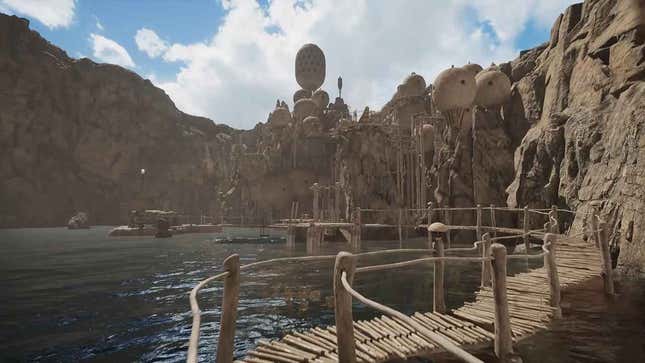Even with its gorgeous modern graphics and intricate puzzles, 2024’s Riven impressed me most with its sounds. The remake of the 1997 sequel to the seminal puzzle game Myst is a masterclass in how creating an ambient soundscape can help flesh out the world of the game. Even with so much visual splendor on display, the songs of Riven’s mysterious islands are what have stayed with me the most since finishing the game.
For the uninitiated, Riven, and its predecessor Myst, drops you on a series of islands devoid (mostly) of other people and populated primarily by complicated puzzles to solve. Both games dole out a story through journal entries and environmental storytelling but the majority of your time in Riven is spent in silence undisturbed by dialogue. What Riven uses to fill that constant silence is an expansive soundscape that paints a sonic portrait of the world you explore.
The Riven remake begins with aggressive metallic sounds. After a short intro you find yourself trapped behind a set of bars that shut on you with a grating reverberation that almost hurts. That industrial hardness becomes a familiar assault on the ears as you play through Riven—levers being pulled, doors turning, mechanical gondolas whirring to life and zipping across metal tracks. Sometimes activation mechanisms can take a handful of seconds to reach completion, all the while the sounds clues you into some complex inner workings at play behind the scenes, giving every action more weight

In contrast to the metallic whir of so many of the game’s puzzles, the islands themselves have a constant natural, soothing hum. Depending on the island, you can stop and listen to the particular chorus of life. One one, a horde of butterflies and unseen insects emit a locust-like humming. On another, the wind rushing through the trees rustles leaves while you explore. But one sound feels particularly omnipresent no matter where you are: the crashing of waves against the islands’ beaches.
This clashing soundscape of nature versus machine isn’t just a treat for the ears but it works as storytelling. Riven is very much a game concerned with the harm of forced industrialization in the context of colonizing a place. The detailed sounds that Riven uses help put the player in a space to recognize this conflict. Even the act of walking feels more meaningful due to how noticeable the change in footfall is between a dirt path and a metal walkway. On a mechanical level, sounds can even be necessary to pay attention to for certain puzzle solutions.
While the bulk of the game makes the islands seem almost devoid of people, certain areas tip you off that you might not be alone. A village with wooden walkways will often creak above or behind you as you walk through, as if someone is hiding just out of sight, while a sudden mechanical whirring in an area where there appears to be no machine makes you aware of the cameras placed around the map that follow your movement.
Riven’s ambient sounds also make its measured use of an actual soundtrack more impactful. Some tracks play as you explore the island, interweaving seamlessly with the mechanical and natural sounds of the world to the point of almost forgetting that this is a soundtrack. But when the track shifts in response to a story beat or a major puzzle being solved it feels momentous and makes you sit up in attention. All of this detail is a wonderful iteration on the 1997 original. As a point-and-click adventure with less graphical fidelity as the 2024 remake’s pristine visuals, the original Riven leverages its world through its sounds. If you give the old game a look you’ll find that, just as in the remake, sound is ever-present. The soundscape of the remake successfully recreates the audio profile of the original and imparts on the player the importance of listening to their surroundings.
.


